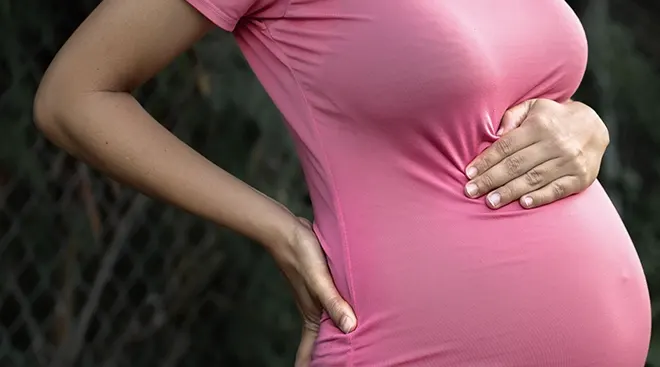Everything You Need to Know About Anemia in Pregnancy
Anemia during pregnancy—and anemia in general—is when you have too few red blood cells to carry sufficient oxygen to your body’s tissues. It’s not unusual for people to become anemic during pregnancy if they don’t have enough stock of iron or the other important vitamins that help produce the red blood cells necessary to increase their blood supply, notes the Cleveland Clinic.
“Blood is a carrier of oxygen, and you and your body need oxygen to function. It’s energy for all things,” says Marti Soffer, MD, a maternal fetal medicine specialist at Massachusetts General Hospital. When you’re pregnant, the amount of plasma in your body increases as does the number of red blood cells, she explains. You become anemic when the number of red blood cells doesn’t increase in line with the plasma. She adds that it’s called dilutional anemia—because you have more fluid in pregnancy but not enough red blood cells to keep up with the demand.
Anemia in pregnancy is so common that pregnant people are screened for it at their first prenatal visit and then again in their third trimester, notes Soffer. The good news is that the vast majority of anemia cases show up in these blood tests. But, if left untreated, anemia in pregnancy can negatively affect you and baby.
Anemia is an all-encompassing term, but there are actually many types of the condition. Below, the most common:
Physiological anemia
According to Janice Hartnett, MD, an ob-gyn at Hartford HealthCare, many pregnant people experience physiological anemia, where plasma accumulates but the number of red blood cells being created just doesn’t keep up. “A pregnant person can accumulate 40 to 50 percent more plasma, which creates a dilutional type of anemia,” she adds.
Iron-deficiency anemia
The other widespread type is iron-deficiency anemia. The American Pregnancy Association notes that anywhere from 15 to 25 percent of all pregnancies experience a deficit of iron, a building-block material in the making of red blood cells. Iron is needed to increase blood supply, says Soffer; it’s key to carrying oxygen from the lungs to the rest of the body.
Folate-deficiency anemia
According to the American Pregnancy Association, folate also helps prevent neural tube defects in pregnancy. But with folate-deficiency anemia, sometimes women aren’t consuming enough of the vitamin to meet the new demands placed on the body by pregnancy. Typically, your doctor will prescribe specific supplements to help resolve this issue.
Vitamin B-12-deficiency anemia
Similar to folate, sometimes women don’t ingest enough vitamin B12 to meet the new demands. Again, your doctor will likely give you specific supplements to help boost your vitamin levels.
Anemia can also be caused by a genetic disorder like sickle cell anemia—which your doctor can detect with blood tests, if you didn’t know you had it already. “For pregnant patients who haven’t been to a doctor in a long time, we test their blood in the first trimester to find out if they have some type of genetic condition that predisposes them to anemia that they never knew about,” explains Soffer. Your body may also be “destroying more blood cells than we thought, making red blood cells in a different way than we would expect, or they may be shaped or sized differently,” she adds.
If you’re anemic while pregnant, know that you’re not alone. The World Health Organization estimates that up to 38 percent of pregnant people worldwide experience anemia. You may be at higher risk for anemia during pregnancy if you are:
- Pregnant with multiples
- Not eating enough iron-rich foods
- Have an underlying genetic condition, such as sickle cell anemia or another hemoglobin disease
- Have a history of heavy periods
- Have had certain bariatric surgeries like gastric bypass
The vast majority of cases of anemia during pregnancy are discovered early in the first trimester, notes Hartnett. While some are detected later on via bloodwork, it’s rare that anemia progresses significantly during pregnancy. If it does, symptoms tend to mirror those of being pregnant in general. “Fatigue and paleness—but show me a pregnant woman who isn’t tired,” says Hartnett.
A craving to chew on and/or swallow non-food things like clay, paper or ice—a condition known as pica—has also been linked to anemia in pregnancy, says Soffer. Pica may be a sign of inadequate nutritional intake. Seek medical attention right away if you’re experiencing light-headedness, feeling faint or having heart palpitations or shortness of breath. Other red flag symptoms to watch out for include blood in your stools or dark black stools (called melena). These could indicate that the cause of your anemia is internal or gut bleeding, which can often be dangerous.
If anemia persists, the biggest impact to you is your quality of life, says Hartnett. “If you’re profoundly anemic, you’re very tired, very sluggish,” she says. The lack of oxygen flowing throughout your body can also result in poor fetal outcomes like preterm labor, low birth weight and even postpartum depression. “If your body doesn’t have enough oxygen to do the work it needs to, that’s not good for Mom, and it’s not good for baby,” adds Soffer.
Delivering a baby while you’re anemic can also set you up for other problems. “We always expect some blood loss at delivery, and you can imagine that if you’re starting with a tank that’s low, it will be even more detrimental when you lose blood at delivery,” says Soffer.
It’s pretty easy to treat mild anemia in pregnancy when it’s caught early. Your doctor will typically prescribe iron supplements or maybe even a prenatal vitamin that contains iron, says Hartnett. “We suggest taking iron supplements with a little orange juice, which helps increase absorption,” she adds. She also recommends eating green leafy vegetables, meat and legumes.
If your iron levels continue to stay low, and you’re not tolerating the supplements well (they can sometimes cause stomach issues, like nausea, constipation or diarrhea), you may need an iron infusion via IV. That said, if your anemia during pregnancy can’t be resolved with these treatments, a blood transfusion may become necessary. “If you’re a patient with a genetic condition, your blood is programmed to be made in a certain way, we can’t fix that /[with iron],” says Soffer.
You may not be able to prevent anemia in pregnancy, but there are some healthy proactive steps you can take to help stave it off even before you get pregnant. Meet with your doctor or midwife and let them know if you have a family history of anemia, genetic diseases or if you get heavy periods. You can proactively request a blood test, suggests Hartnett.
Taking a prenatal vitamin with iron and eating more iron-rich foods before and after conceiving might help too. Leafy greens, like spinach and kale; beans; lentils and meat—especially liver—can tip iron levels in your favor, says Soffer. (Of course, she adds that organ meat is not everyone’s cup of tea—especially during the nausea-prone months of pregnancy.) Up the ante on vitamin C-heavy foods too when you consume iron-rich options; this may help your body absorb the mineral, she adds.
Lastly, don’t overdo it. Eating meat every day or preemptively taking iron pills when your doctor hasn’t prescribed them could cause other problems, cautions Soffer. “If you’re tired and you’re 18 weeks pregnant, iron may not fix that,” she says. “You have to balance too much of a good thing.”
Please note: The Bump and the materials and information it contains are not intended to, and do not constitute, medical or other health advice or diagnosis and should not be used as such. You should always consult with a qualified physician or health professional about your specific circumstances.
Janice Hartnett, MD, is an ob-gyn with Hartford HealthCare in Connecticut. She received her medical degree from the University of Connecticut School of Medicine.
Marti Soffer, MD, MPH, is a maternal fetal medicine specialist at Massachusetts General Hospital and an instructor at Harvard Medical School. She received her medical degree from the Icahn School of Medicine at Mount Sinai in New York.
Cleveland Clinic, Anemia During Pregnancy, May 2022
American Pregnancy Association, Anemia During Pregnancy, 2023
World Health Organization, Prevalence of anaemia in women aged 15-49, by pregnancy status (%), 2023
Learn how we ensure the accuracy of our content through our editorial and medical review process.
Navigate forward to interact with the calendar and select a date. Press the question mark key to get the keyboard shortcuts for changing dates.




















































